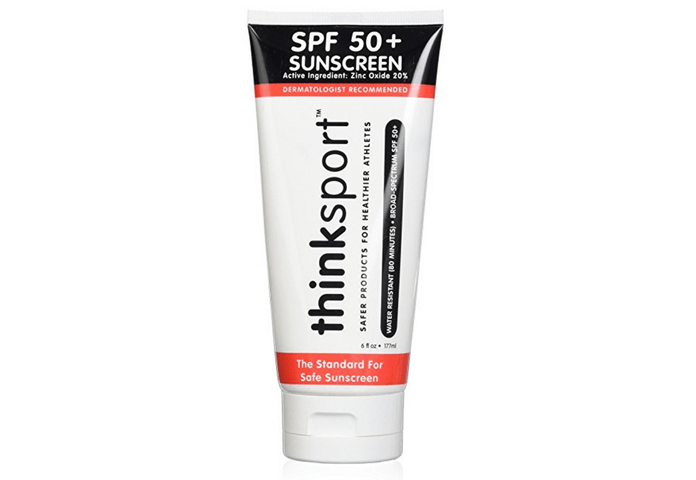
The safest sunscreen for the beach
Consistently a top pick for best sunscreen, thinksport’s SPF 50+ sunscreen is waterproof for up to 80 minutes, doesn’t feel oily, and—most important—provides broad-spectrum UVA and UVB protection thanks to a 20 percent dose of non-nano zinc oxide. It’s that zinc oxide, a staple of mineral-based sunscreens, that the Environmental Working Group (EWG) particularly loves because it sits on top of the skin, acting as a physical barrier to the sun and reflecting away its harmful UV rays. Chemical sunscreens, on the other hand, are absorbed into the body, and chemicals like oxybenzone may cause hormone disruptions, biochemical, or cellular-level changes, and skin allergies. Oxybenzone and octinoxate are also toxic to coral reefs, and Hawaii may soon ban the sale of sunscreens that contain them. Here are some more reef-safe sunscreens to consider.
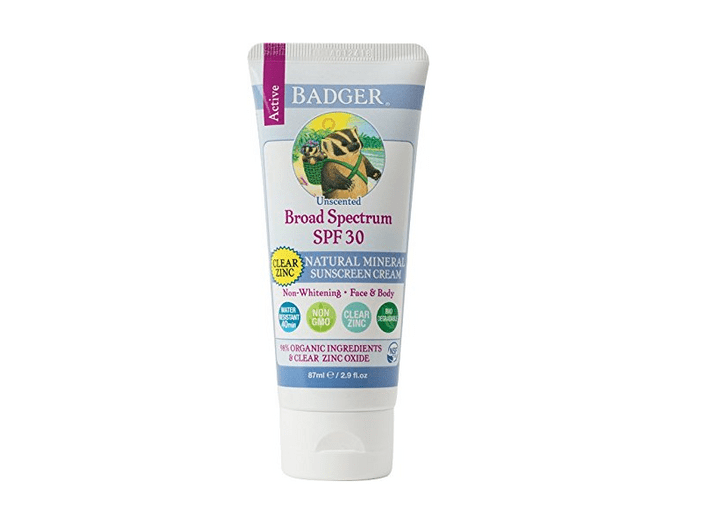
The safest sunscreen for everyday use
When you’re using something every single day, you definitely want it to be safe—and let’s be honest, also easy to use. That’s why Badger Active Clear Zinc Sunscreen Cream SPF 30 is so appealing. It provides broad-spectrum coverage and is water resistant for up to 40 minutes, but unlike many other mineral sunscreens, this one adjusts to your skin tone without leaving a white film. It’s also lightweight and fragrance-free. An important addendum: You should be using SPF every day, all year long. A study published in the journal Dermatologic Surgery found that using sunscreen not only prevents future sun damage but can also reverse existing damage, including wrinkles and hyperpigmentation. Scientists theorize this may be because blocking sun exposure with daily SPF allows the skin to rest and regenerate properly instead of incurring more damage and hindering the healing process. Find out the sunscreens dermatologists use on themselves.
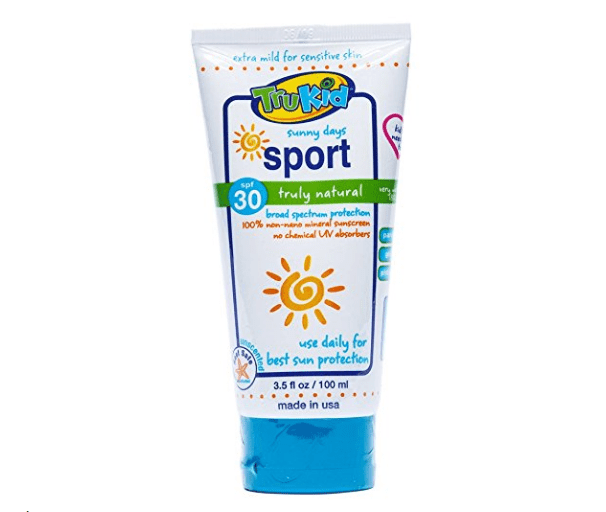
The safest sunscreen for kids
Non-nano zinc is the main mineral block in TruKid Sunny Days Sport Sunscreen SPF 30, which is also eczema-safe and free of phthalates, parabens, and vitamin A. Chemical sunscreens are particularly worrisome when it comes to children because oxybenzone may disrupt estrogen and testosterone levels. While some researchers caution that more testing is needed to make a full ruling on this, why take the chance when there are fantastic alternatives like this available? TruKid is also a great choice because it’s easy to apply and doesn’t leave much of a white residue on the skin. Don’t miss these sunscreen mistakes you may not know you’re making.
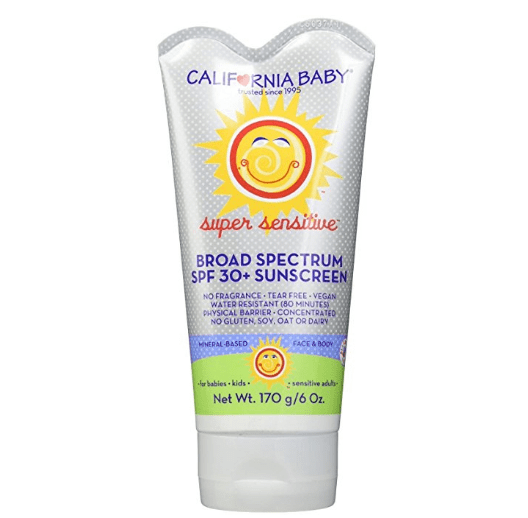
The safest sunscreen for babies
There’s nothing more lovely and delicate than baby skin—and nothing more terrifying to a parent than to see it exposed to the blazing summer sun. The active ingredient in California Baby Super Sensitive Sunscreen SPF 30+ is titanium dioxide, which, like zinc, scatters and reflects the sun’s cancer-causing rays. Made for sensitive skin, it is fragrance-free, contains natural and organic ingredients, and is soy-free, oat-free, dairy-free, gluten-free, and almost completely nut-free (it contains coconut). Just keep in mind that when it comes to infants under six months old, your first line of defense should be keeping baby in the shade as much as possible and protecting their skin with hats and sun-protective clothing as well. A mineral sunscreen can—and should—be used on any exposed skin, according to the American Academy of Pediatrics.
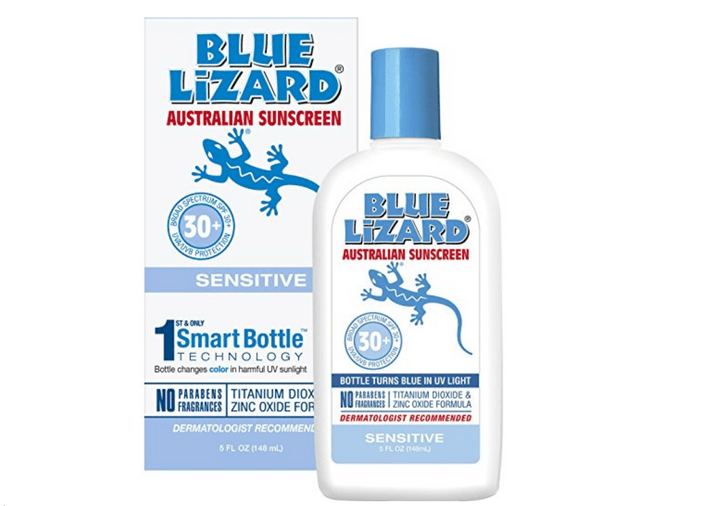
The safest sunscreen for sensitive skin
Babies aren’t the only ones with sensitive skin. For adults who want to stay safe but often get irritated or break out from lotions and potions, this fragrance- and paraben-free formulation is a good bet. Blue Lizard Australian Sunscreen Sensitive SPF 30+ is a favorite of dermatologists and pediatricians, and its broad-spectrum, mineral-based sunscreen contains both zinc and titanium. Pregnant and breastfeeding women should also pay special attention to sunscreen safety, and not just because pregnant skin is more sensitive and prone to burns: Studies have suggested that oxybenzone exposure during pregnancy can affect birth weight for babies of both sexes and is linked to earlier labor with male fetuses, while scientists at the University of Zurich found high amounts of the chemical in breast milk. Don’t miss these signs that you just bought the wrong sunscreen.
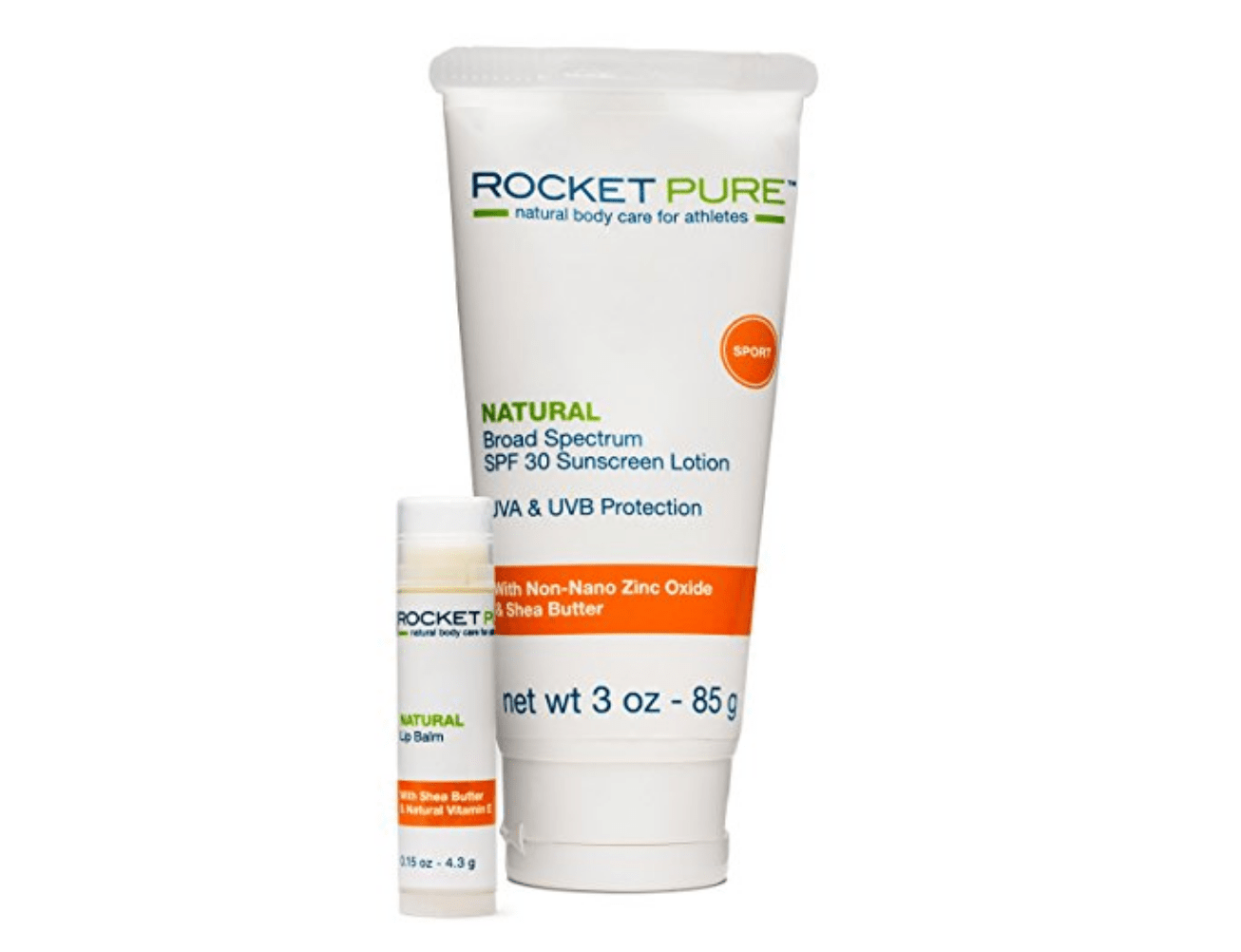
The safest sports sunscreen
Geared toward runners, cyclists, swimmers, and other outdoor athletes, Rocket Pure Natural Sport Sunscreen SPF 30 is designed to stay put when challenged by sweat and water. With a whopping 25 percent zinc, it has the highest concentration of mineral-based protection of any of the sunscreens listed here. Just remember that to be safe, you need to reapply at least every two hours and make sure you’re using an ample amount to cover your entire body. You may want to memorize these eight sunscreen dos and don’ts.
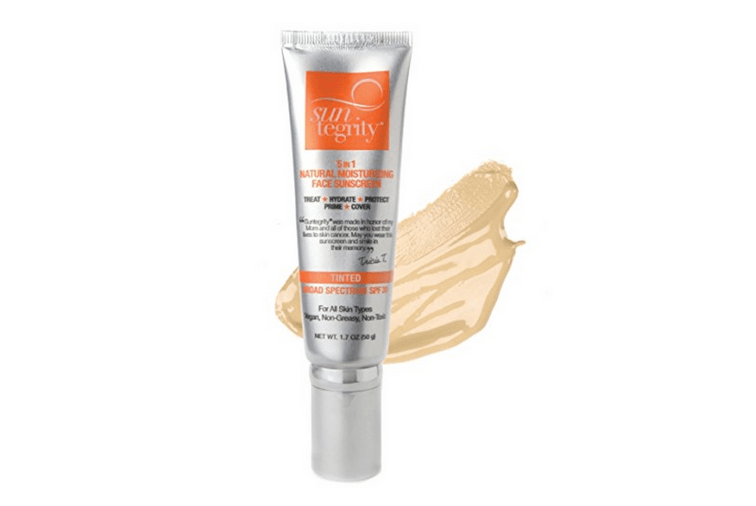
The safest tinted sunscreen
It’s the ultimate fake-out: Show off a sun-kissed glow while you’re at the beach while at the same time protect your skin from sun exposure. The Badger Tinted Sunscreen Unscented SPF 30 also solves two more sunscreen challenges: Its mineral-based tint circumvents the annoying problem of zinc turning you white, plus you can avoid that icky feeling of layering heavy makeup over sunscreen on hot, humid days. Honorable mention for the face: Suntegrity Skincare 5 in 1 Natural Moisturizing Face Sunscreen SPF 30, with its 20 percent non-nano zinc. At $45, it’s quite a bit pricier than the $14 Badger, but as you’re getting a moisturizer, sunscreen, and foundation in one and it’s formulated for the delicate skin of your face, you can think of it more as an investment than an indulgence…or so we tell ourselves.
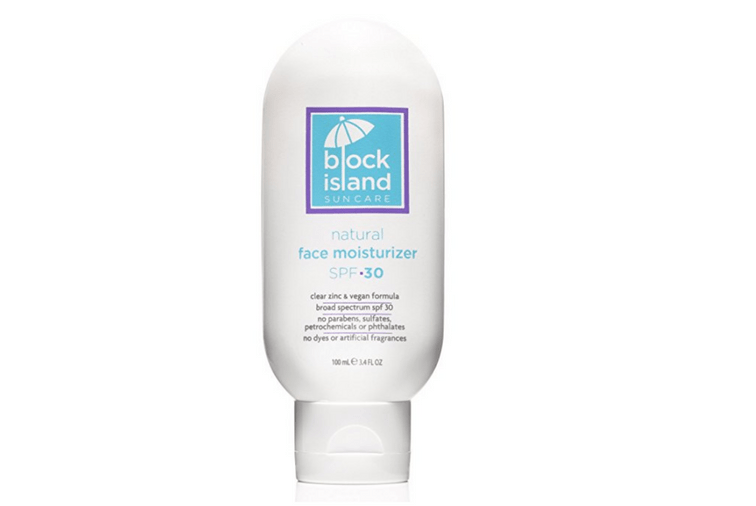
The safest moisturizer with SPF
For those days when you’re inside more than outside, moisturizer with added sun protection is a good option. Block Island Organics Natural Face Moisturizer SPF 30, a sunscreen/moisturizer combo, which contains 22 percent of invisible zinc, protects your skin from UVA and UVB rays but won’t leave a ghostly residue and goes on well under makeup. It also contains hydrating aloe and shea butter, as well as vitamin E. Don’t miss these things that could increase your risk of sun damage.
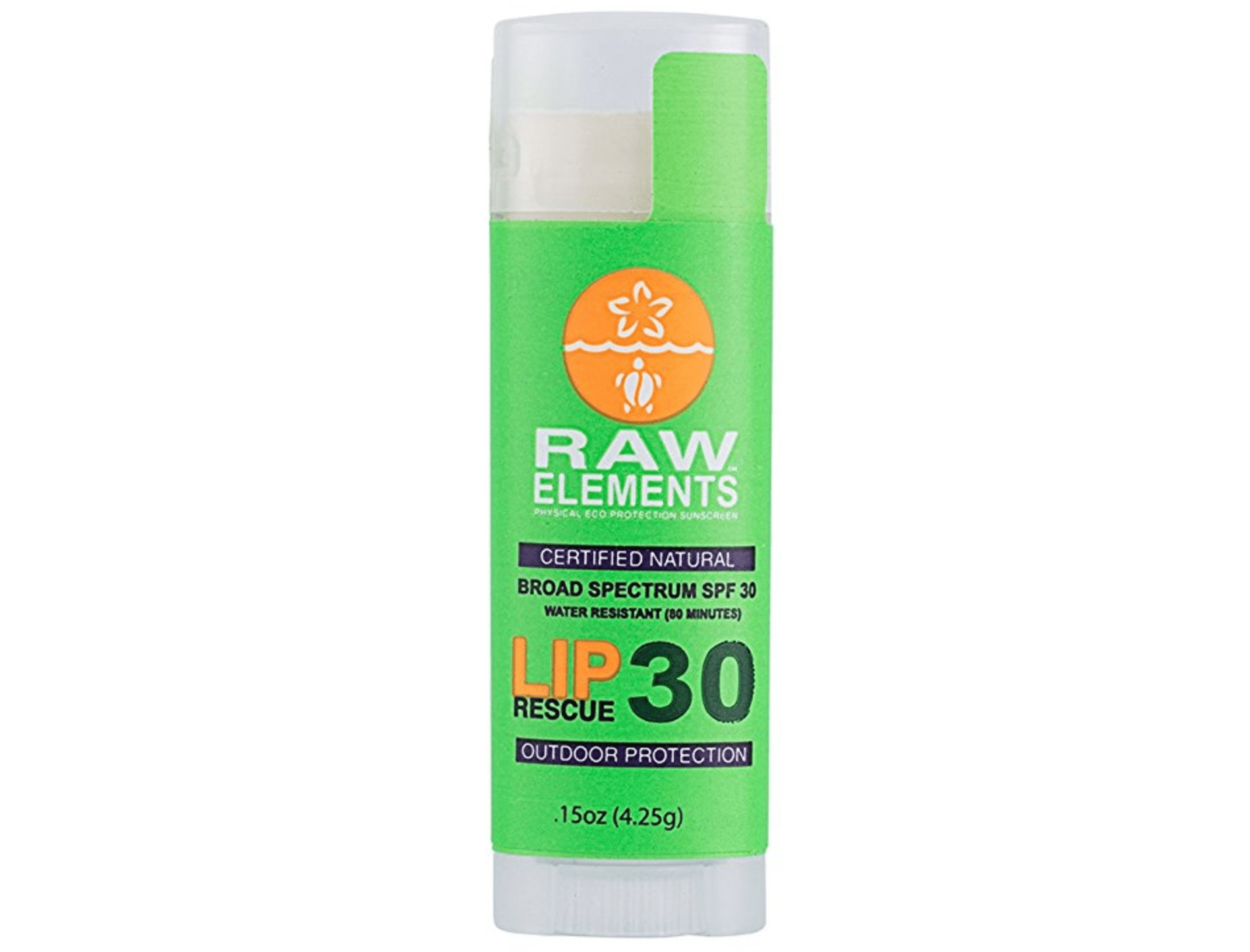
The safest lip balm with SPF
Pucker up! Your lips need just as much protection as the rest of your face—and you don’t want to be inadvertently eating chemicals. Raw Elements USA Lip Rescue Sunscreen SPF 30 contains a hefty dose of non-nano zinc oxide and is water resistant for up to 80 minutes. It’s also super hydrating, with sunflower oil, mango and cocoa butter, rosemary oil extract, and vitamin E on the ingredient list. While this is a particularly good choice for summer months, as it has the minimum SPF recommended by the American Academy of Dermatology, that unassuming tube of Burt’s Bees All Weather Moisturizing Lip Balm SPF 15 also earns high marks from the EWG. Lips are just one of the critical spots that dermatologists wish you’d remember to apply sunscreen.
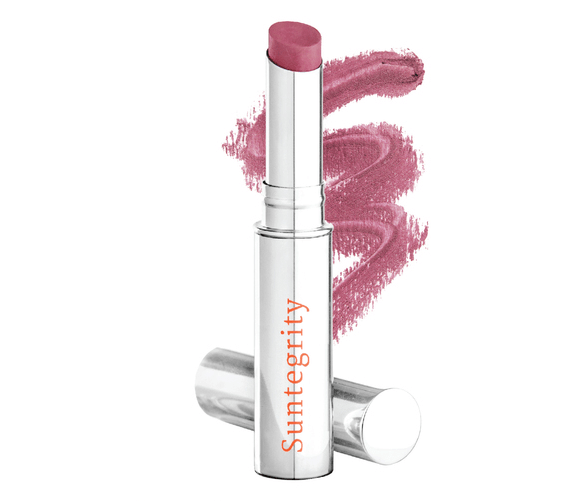
The safest tinted lip balm with SPF
While you’re looking for lip protection, you don’t have to give up lip color to be sun-smart. Suntegrity LIP CPR SPF 30 Lipstick gets the EWG’s thumbs-up and is available in a cornucopia of colors, including Moonlight Merlot, Sunburst Pink, Sunny Blush, and Sunrise Peach. These lipsticks provide a broad-spectrum SPF 30 protection with 18 percent zinc oxide, plus they hydrate your lips with organic jojoba oil, shea butter, and cocoa butter, and mitigate the appearance of fine lines with “lip repair lipids” and “konjac root wrinkle-filling spheres.”
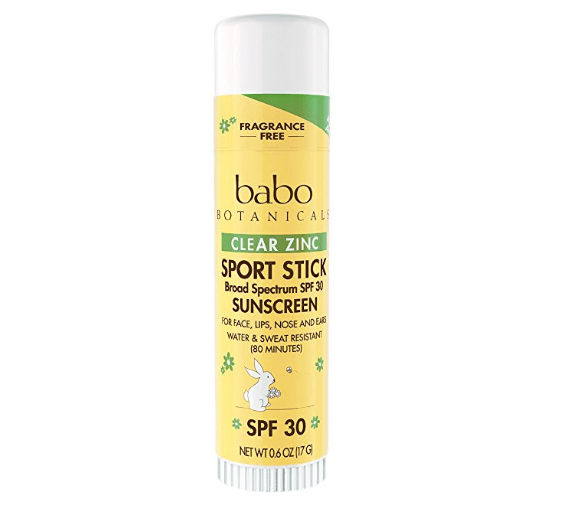
The safest SPF stick
Once the domain of white-nosed lifeguards, the sunscreen stick has come a long way. Babo Botanicals Clear Zinc Sport Stick Sunscreen SPF 30 is an extra-sensitive formula designed for the face, lips, nose, and ears. It contains 15 percent zinc that goes on sheer or slightly white but then disappears quickly as you rub it into your skin. Water- and sweat-resistant for 80 minutes, it’s also kind to skin, thanks to jojoba, avocado, shea butter, and beeswax. Stick sunscreens are particularly helpful when applying sunscreen on squirmy toddlers—and much safer than the popular spray-ons that might not coat your skin fully, especially on windy days—and the airborne chemicals can be inhaled.
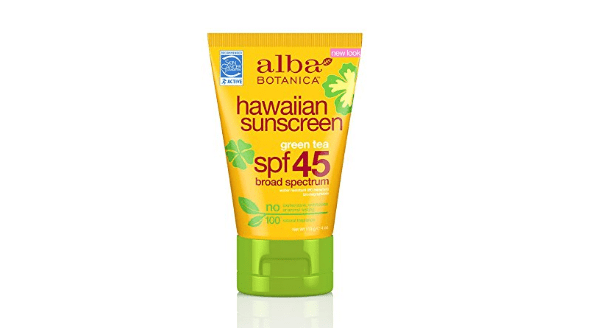
The safest non-mineral sunscreen
Yep, you read that right: Alba Botanica Hawaiian Sunscreen Green Tea SPF 45 is a non-mineral sunscreen, meaning that it contains some of the chemicals that the EWG isn’t crazy about. But the EWG does have a category for the safest non-mineral sunscreens, recognizing that some people may want to choose this option despite the cited risks. That said, this Alba Botanica version doesn’t contain oxybenzone, the biggest chemical offender; instead, it has 3 percent of avobenzone, which presents a low risk of toxicity, according to the EWG. This product doesn’t contain parabens or synthetic fragrances, is water resistant for up to 80 minutes, and is recommended by the Skin Cancer Foundation. In addition to applying sunscreen religiously, here are eight other things that dermatologists do every summer.